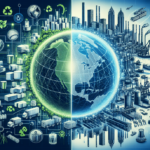Georgia-Pacific vs Oji Holdings Corporation: A Comprehensive Comparison
Introduction
In the competitive landscape of pulp and paper production, Georgia-Pacific and Oji Holdings Corporation stand out as industry leaders. Both companies are multi-billion dollar entities with a global presence, yet they operate in distinct regions and embody different corporate philosophies. This article delves into an in-depth analysis of these two giants, exploring their histories, product offerings, financial performances, business models, corporate cultures, innovation strategies, environmental impacts, legal challenges, and future prospects.
Company Overviews
Georgia-Pacific
Georgia-Pacific is an American pulp and paper company headquartered in Atlanta, Georgia. Established in 1927, it has expanded into one of North America's largest manufacturers of tissue, pulp, paper, packaging, and building products. The company operates over 200 facilities across the United States, Canada, and Europe, employing more than 35,000 individuals worldwide. Georgia-Pacific is a subsidiary of Koch Industries, benefiting from the conglomerate's extensive resources and strategic guidance.
Oji Holdings Corporation
Oji Holdings Corporation, headquartered in Tokyo, Japan, boasts a rich history dating back to 1873. As Japan's first modern paper manufacturer, Oji has diversified its operations to include a wide array of products such as paper, packaging, building materials, chemicals, and energy. With over 300 subsidiaries globally, Oji employs over 28,000 people. The company's commitment to sustainability is evident through its "Green Oji" program, focusing on sustainable forestry and waste reduction.
Historical Background
Georgia-Pacific's Evolution
Founded by Owen Robertson Cheatham in Augusta, Georgia, Georgia-Pacific initially focused on plywood and lumber production. Over the decades, the company diversified by acquiring Bestwall Gypsum, Hammermill Paper Company, and American Enka during the 1960s and 1970s. The 1980s and 1990s marked significant expansion through acquisitions of Fort James Corporation, Unisource Worldwide, and Buckeye Technologies. In 2005, Koch Industries acquired Georgia-Pacific, integrating it into their vast conglomerate.
Oji Holdings' Growth
Oji Holdings Corporation was established during Japan's Meiji period by Shibusawa Eiichi. The company overcame early financial and natural challenges to establish a strong domestic presence. The 1980s and 1990s saw Oji engaging in numerous mergers and acquisitions, including Kanzaki Paper, Tokai Paper, and Japan Pulp and Paper Company. In 2012, Oji merged with Hokuetsu Kishu Paper, solidifying its position as Japan's largest pulp and paper company.
Products and Services
Georgia-Pacific's Product Range
- Tissue: Quilted Northern, Angel Soft, Brawny
- Pulp and Paper: Copy paper, office paper, printing paper
- Packaging: Corrugated boxes, containerboard, cartons
- Building Products: Gypsum, lumber, insulation materials
Oji Holdings' Product Range
- Paper: Newsprint, printing paper, specialty paper
- Packaging: Paperboard, cartons, bags
- Building Materials: Plywood, laminated lumber, OSB
- Chemicals: Resins, adhesives, coatings
- Energy: Electricity, heat, biomass fuel
Both companies offer additional services beyond their main products. Georgia-Pacific provides recycling services for paper and packaging products and consulting services for sustainable forestry practices. Meanwhile, Oji Holdings Corporation offers logistics and transportation services, along with technical support for its customers.
Financial Performance
Georgia-Pacific's Financial Highlights
- Revenue (2022): $22.4 billion
- Net Income: $1.3 billion
- Total Assets: $27.3 billion
- Total Liabilities: $15.2 billion
Oji Holdings Corporation's Financial Highlights
- Revenue (2022): ¥1.5 trillion (≈$11.4 billion)
- Net Income: ¥42.5 billion (≈$322 million)
- Total Assets: ¥2.5 trillion (≈$19 billion)
- Total Liabilities: ¥1.8 trillion (≈$13.7 billion)
According to their Bloomberg profiles, both companies have demonstrated resilience in the face of global economic challenges, including the COVID-19 pandemic. Georgia-Pacific maintained steady revenue streams, while Oji Holdings Corporation saw a revenue increase of approximately 3% in 2022. Both companies have implemented strategic cost-cutting measures to sustain profitability.
Business Models
Georgia-Pacific's Business Strategy
- As a subsidiary of Koch Industries, Georgia-Pacific leverages financial backing and strategic insights from a diversified conglomerate.
- Focus on vertical integration to control the supply chain from raw material sourcing to product distribution.
- Emphasis on operational efficiency through automation and digitalization.
- Commitment to sustainability by incorporating recycled materials and reducing water usage.
Oji Holdings Corporation's Business Strategy
- Standalone company with a strong emphasis on research and development.
- Investment in advanced technologies such as enzymatic bleaching and lignin utilization.
- Formation of joint ventures to expand product offerings and market presence.
- Focus on sustainable practices, aiming to reduce greenhouse gas emissions and promote renewable energy sources.
Corporate Culture
Georgia-Pacific's Corporate Environment
- Culture of continuous improvement and operational excellence.
- Prioritizes efficiency, waste reduction, safety, and environmental stewardship.
- Encourages employee development and fosters a collaborative work environment.
Oji Holdings Corporation's Corporate Environment
- Culture of innovation and collaboration.
- Encourages creative thinking and idea sharing among employees.
- Strong emphasis on social responsibility and contributing to societal well-being.
Innovation Strategies
Georgia-Pacific's Innovation Initiatives
- Adoption of advanced technologies such as robotics and automation to enhance production efficiency.
- Development of new products like bio-based plastics and eco-friendly packaging materials.
- Investment in digitalization to streamline operations and improve customer interactions.
Oji Holdings Corporation's Innovation Initiatives
- Focus on sustainable technologies including enzymatic bleaching and lignin utilization.
- Heavy investment in research and development to create functional papers and high-performance materials.
- Collaboration with academic institutions and industry partners to drive technological advancements.
Environmental Impact and Sustainability
Georgia-Pacific's Environmental Efforts
- Set a goal to reduce greenhouse gas emissions by 25% by 2025.
- Increased use of renewable energy sources such as biomass and wind power.
- Implemented water conservation measures and waste reduction initiatives.
- Committed to responsible forestry practices, sourcing from certified sustainable forests.
Oji Holdings Corporation's Environmental Efforts
- Aims to reduce greenhouse gas emissions by 30% by 2030.
- Sources 80% of raw materials from certified sustainable sources.
- Reduces water consumption through efficient processes and recycling.
- Minimizes waste generation by adopting circular economy principles.
Both companies adhere to international sustainability standards and have received certifications from organizations such as the Forest Stewardship Council (FSC).
Legal Challenges
Georgia-Pacific's Legal Disputes
- In 2016, Georgia-Pacific filed a lawsuit in the U.S. against Oji Holdings Corporation alleging anticompetitive practices in the thermal paper market. The dispute was resolved through an out-of-court settlement.
- In 2019, Georgia-Pacific lodged a complaint with the International Trade Commission, accusing Oji of selling uncoated paper in the U.S. at unfairly low prices. The complaint was ultimately dismissed.
Oji Holdings Corporation's Legal Challenges
- Faced several patent infringement cases related to paper manufacturing technologies.
- Engaged in trade disputes over the import and export of paper products in various international markets.
These legal battles underscore the competitive tensions within the global pulp and paper industry.
Future Outlook
Georgia-Pacific's Future Prospects
- Continues to focus on enhancing operational efficiency and reducing costs.
- Explores new markets and geographic regions for expansion, particularly in emerging economies.
- Invests in environmentally friendly products to meet increasing consumer demand for sustainable options.
- Leverages digital technologies to improve supply chain management and customer engagement.
Oji Holdings Corporation's Future Prospects
- Maintains a strong emphasis on innovation and research to stay competitive.
- Seeks to expand product offerings and geographic presence through strategic acquisitions and partnerships.
- Focuses on sustainable growth by investing in renewable energy and eco-friendly manufacturing processes.
- Adapts to market trends by developing high-performance and functional paper products.
Both companies are well-positioned to navigate future industry challenges by leveraging their strengths in sustainability and innovation. Their strategic initiatives will play a crucial role in shaping their trajectories in the global market.
Conclusion
In summary, Georgia-Pacific and Oji Holdings Corporation are two of the most influential players in the pulp and paper industry. While they operate from different geographic bases and possess unique business models, both share a steadfast commitment to sustainability and innovation. Their continued focus on operational excellence, environmental stewardship, and technological advancement positions them favorably to tackle future industry challenges and capitalize on emerging opportunities.






















